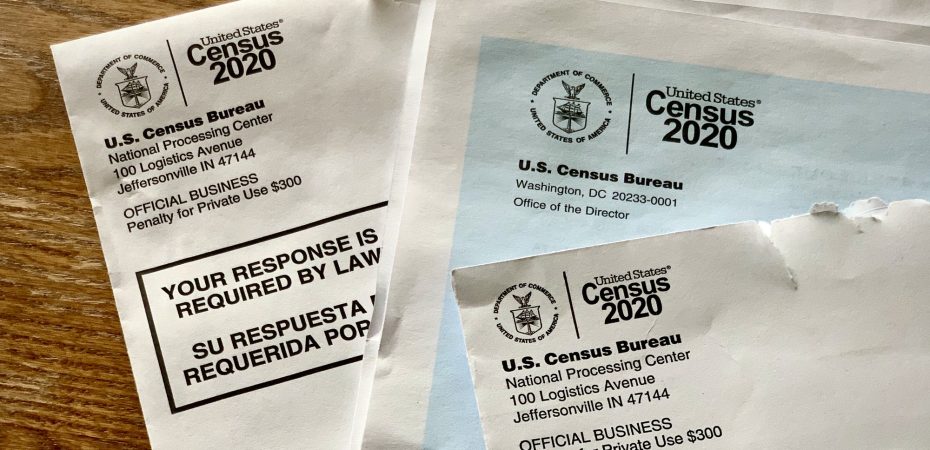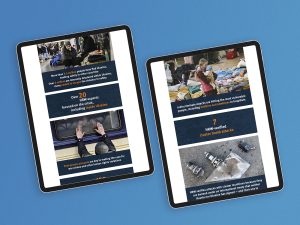The speed of economic, social, and life and death news these days has required last-minute pivoting of unprecedented proportions and pace. But here’s something we can prepare for. The devastating impact of what will be a horribly inadequate 2020 census.
Almost all of you will have missions that will be gravely impacted by the undercounting of our country’s most vulnerable populations— be they immigrants, people living in poverty, people of color, people with disabilities, people without homes, people with chronic illness, people lacking food, students depending upon public education, the elderly… the list goes on and on. Any population that is undercounted will receive less funding than necessary.
We know this will be an issue. It is not a secret. It will not come as a surprise. We will not need to pivot at the last second.
At Faircom, we pivot when necessary, we plan in advance when we can.
For example, we know that 2020 election results will impact all of our clients one way or another depending upon who wins. Are we waiting to see who will win? No. We have 3 plans for each client: 1) If Trump wins, 2) If Biden wins, 3) If the election is contested. We know that one of these will happen. We just don’t know which one.
Now we are armed with the knowledge that insufficient populations counts will take vital funds from any program relying on government funding. We can plan now.
If you need advice on how to plan accordingly, contact us. We can help.
IMPORTANT ARTICLE FROM THE CHronicle of philanthropy
A New Move to Limit the Census Will Harm Virtually Every Cause
By Gary D. Bass , Antonia Hernández, Ann B. Stern, La June Montgomery Tabron, and Darren Walker.
The United States is in the midst of a pandemic and movements for racial justice just as one of the most important activities affecting virtually every mission nonprofits and foundations care about is underway: the 2020 census.
The census is vital because it determines federal funding and political representation for every person and community over the entire next decade. The constitutionally required count is the largest peacetime deployment our government undertakes every 10 years. It must be done right.
Yet this week, as Covid-19 has made getting an accurate count harder than at any other time in recent memory, the Commerce Department suddenly cut short the time for enumeration.
That will have devastating consequences for people the census always undercounts. A poor count will mean communities won’t get their fair share of federal funding for Medicaid, economic development, child care, schools, road and public transit improvements, home-heating assistance for the elderly, and many more vital services. It alters fair representation in Congress. It undermines accuracy of data used for local planning for schools, hospitals, and public services. A bad count can’t be allowed to happen.
The essential role of the census is why we are part of an unprecedented collaborative of hundreds of grant makers and nonprofits that have been working with federal and state officials since 2015 to promote a fair and accurate count. We have focused on those who typically get left out — people of color, young children, low-wage workers, people who are unemployed, immigrants, and others. Our grants and advocacy have helped nonprofits and other trusted voices in communities across the country encourage everyone to fill out their census forms.
The 2020 census has faced numerous operational challenges, including distrust of government, a possible citizenship question that the Supreme Court ultimately rejected, online disinformation campaigns, and, of course, the nation’s health and economic crises.
Organizers spent years planning “get out the count” campaigns and events that were about to launch when Covid-19 shut down the country. The Census Bureau quickly and reasonably extended data collection from July 31 to October 31 and called for a delay of its first release of data by four months, from the end of December to the end of April 2021.
But this week the bureau suddenly switched course, announcing it would stop collecting data through door knocking, online, phone, and mail on September 30 and push ahead to meet the December deadline. This undermines getting a complete count and compresses the time the bureau has to ensure the data is accurate — making a flawed census a near certainty.
‘Mad Respect’
Census Bureau workers and the nonprofit groups we support show an unquestionable commitment to their jobs and to the spirit of the census. Their work is inspiring, and they must be allowed to finish. Last week, a Maine resident tweeted that despite living on a tiny island with no bridges and no access to cars, “today the Census guy showed up at our door.” He kayaked to the island to ensure they were counted. The woman added, “Mad respect.”
We agree. Our grantees shifted on a dime when the virus hit to develop online strategies to reach people through texting, emails, phone banks, and digital and traditional ads.
Outreach pivoted from churches and day-care centers, shuttered in response to the virus, to supermarkets, health centers, and food pantries, the few places people still go. Artists created inspiring works and messages. Caravans and buses circulated through neighborhoods to spread information about the census from a safe distance. Virtual social events, some with deejays, have also been planned. Many of these events and ads cost money and took months of planning, with October 31 as the deadline in mind.
As of this week, the best estimates suggest that some 60 million households have not yet been counted; roughly 4 out of 10 households have not yet responded to the census. In 27 tribal areas, the response rates are below 10 percent, largely because Covid-19 has hit tribal nations so hard.
All but four states are below the 2010 response rate — and they have had nearly three extra months to collect data compared with 2010. Even within the states that have met their 2010 response rates, cities and rural areas with high numbers of immigrants, people of color, and low-income populations have lower response rates than others.
Because of the health pandemic, enumerators and organizers need every day possible to reach communities nationwide. Cutting the count short by a whole month eliminates critical time for door-to-door outreach to households that have not yet responded, impairing our efforts for a fair and accurate 2020 census.
In California, farmworkers are in the midst of peak season and will work long hours through September so they may not be home when enumerators visit and will not be counted. In Texas, organizers faced many obstacles in getting everyone to fill out the census, including no state funding to support an accurate count.
It is vitally important that we spend October counting people in places that are rural and urban, large and small, red and blue. Cutting the 2020 census short is unnecessary. Processing and checking the data quality normally take five months; rushing those steps to meet the December deadline is troubling and dangerous.
Potential for Historic Undercounting
Moving the finish line to September 30 could result in historically high undercounts and create ethnic and racial inequities for the forthcoming decade.
The Census Counts campaign — led by the Leadership Conference Education Fund, Naleo Educational Fund, and Asian Americans Advancing Justice/AAJC — has launched a comprehensive campaign to restore the census deadline to October 31. We are among more than 500 philanthropic leaders who have mobilized in the last few days to sign a letter to the Census Bureau and commerce secretary urging them not to rush the significant enumeration and data processing that remain unfinished. There is far too much at stake if government leaders cut back the census by 31 days. We need every minute to ensure that every person is properly counted.
The census is a fundamental building block of our democracy. We cannot idly sit by as the finish line is arbitrarily moved and the principles of equal representation are eroded.
The authors are all leaders of their foundations: Gary Bass of Bauman Foundation, Antonia Hernandez of California Community Foundation, Ann B Stern of Houston Endowment, La June Montgomery Tabron of W.K.Kellogg Foundation, and Darren Walker of Ford Foundation.




